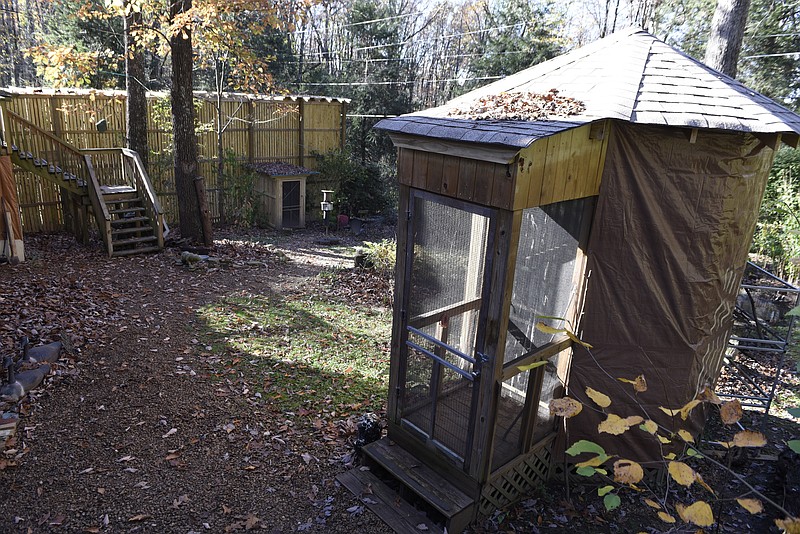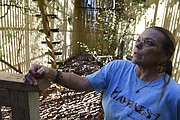Happinest Wildlife Rescue
What: The Chattanooga area’s primary bird rehabilitatorsWhat to do: If you find a bird you think is injured, call Alix Parks at 423-847-5757 for help with raptors or Sherry Teas at 423-593-0032 for songbirds.Fact: One billion birds are killed every year in the United States by flying into windows.
Strips of newspaper rustle underneath the feet of two caged hawks and those of Alix Parks as she bounces around her garage, engrossed in another day of her life's work.
"There's so many dangers for large birds of prey," she says, rattling off a list of perilous things that have brought winged creatures to her Signal Mountain home over the years.
Then she pauses for a moment to hold up a rusted chain.
"And every once in a while, I'll get one of these," she said.
"Feel this," Parks said, imploring Booker T. Washington State Park employees Levan Gardner and Robert Thomas to grab the chain. "Feel the weight of this."
An owl, one of the countless birds Parks has rehabilitated over four decades, was once a captive of the chain. It was part of a trap an area farmer placed to protect his chickens from the birds of prey Parks cares for.
Now the chain stays in her garage, where it serves as a tangible example of the challenges she has helped otherwise-doomed birds overcome in the last 40 years.
In five years, it might be on display in a full-fledged wildlife rehabilitation center rather than Parks' garage.
Parks and Sherry Teas, who rehabilitates songbirds through the duo's organization called Happinest Wildlife Rescue, are the primary licensed bird rehabilitators in the Chattanooga area. They have developed a grand vision for their future - one they hope can bolster a unique operation already responsible for the rescue of thousands of area birds.
Step one is organizational. Happinest and its five-person board have applied for nonprofit status and are expected to receive confirmation by the end of the month.
Parks says it will boost the credibility of their organization, which is already widely respected in the local wildlife community.
People like Gardner and Thomas know Parks well. They bring Maggie, an educational bird from the Booker T. Washington park, to Parks for care about once a month.
Among the other groups Happinest serves, the Chattanooga Zoo counts the organization as the area's go-to bird rehabilitators and does intake for the group.
But after about 40 years of caring for birds out of her home, Parks and Teas are pushing for Happinest to gain more visibility. They hope to expand its reach and open the wildlife rehabilitation center within five years.
"And I really think we can get it going quicker than that," Teas said.
Happinest purchased the Internet domain name "happinestwildlife.com" last week.
In an effort that's been primarily self-funded but desperately needed, the two are hoping to a push forward could open the group up to new resources.
"They're a pillar of wildlife rehabilitation in this community," Chattanooga Audubon Society sanctuary manager Kyle Simpson said of Parks. "I don't know how else to say it. It's enormous what they do."
Caring for the injured or sick birds is a time-consuming and emotionally taxing mission fueled by passion.
Parks supports her rehabilitation work largely through her pet-sitting business. She saved money for eight years to build her first backyard bird sanctuary. Now her backyard contains a small network of large, wood-paneled structures with perches and natural features where rehabilitating birds can get their wings back.
"I love what I do. I don't want to do anything else," Parks said. "I'll do it as long as I can afford it and as long as I'm not too senile or too feeble. That'll happen eventually, but hopefully not soon."
Right now she has four red-tail hawks, two broad-wing hawks, an American kestrel falcon and a barn owl in her care. Each bird has a name, a story and a unique condition that requires detailed care from Parks, who is also the primary caregiver for her elderly mother.
The most glaring example of the attention required of Parks sits in a basket in her kitchen. It's a baby barn owl, struggling for life, who might not have had a chance to survive if not for Parks.
"First of all, the knowledge she has to have just to rehab, then, like with the barn owl, she has to take care of that like a baby," said Gardner, a manager at Booker T. Washington State Park. "She has to check it every few minutes, make sure it's fed, things like that.
"Most people don't have the time or the patience. You've got to have that caring aspect."
Gardner said before park rangers were introduced to Parks, they would take their education birds to veterinarians for care. Often, he said, the vets did not have time or expertise to cater to the needs of a specific bird.
But the nuances are Parks' niche.
Of the birds in her care now, one was hit by a car, another flew into power lines and another has a vision problem.
"I educated myself. I sought the knowledge, got the books, took classes when they were offered, did a symposium, got a couple of good mentors," Parks said. "That's how I learned. You've just got to dedicate your life to them, really. If this was all I could do, it's what I would do."
Teas, who owns a hair salon, did not know where to take a bird that seemed injured that she found in her yard after the tornadoes of April, 27, 2011, so she sought information on how to care for it herself. The pursuit eventually led her to Parks.
The two quickly formed a friendship and Teas became an apprentice under Parks. Now Teas rehabilitates as many as 100 songbirds at a time out of her Harrison home during peak season.
It's an undertaking so large she needed 10 volunteers to care for the birds when she went on a four-day vacation in September.
"Without Sherry, a lot of these birds would die," said David Aborn, a University of Tennessee at Chattanooga biology professor who studies bird migration.
Aborn has partnered with Parks and Teas to band the birds they rehabilitate so the birds can be tracked and the species understood better.
The banding is part of the bigger, ornithological picture that both Teas and Parks appreciate the value of and enjoy contributing to.
But what keeps them pouring their time and resources into Happinest is not necessarily scientific advancement.
"You see the results of your work," Parks said. "Just watching these birds that come to me nearly dead go from where they can't stand to flying and being releasable, it's a thrill to release a bird."
Upon release, droppings on the newspaper are generally the most thoughtful mementos the birds leave behind to help the rehabilitators remember their time together.
But every once in a while, they leave a chain.
Contact staff writer David Cobb at dcobb@timesfreepress.com or 423-757-6249.

